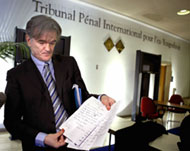Milosevic ‘took rogue drug on purpose’
Slobodan Milosevic deliberately took a drug that neutralised the effects of his heart medicine, an expert who examined his blood has said.

Donald Uges, a Dutch toxicologist, said on Monday: “I am sure he took the medicine himself because he wanted a one-way ticket to Moscow [for treatment].
“That is why he took rifampicine.”
Rifampicine is a powerful antibiotic used to treat leprosy or tuberculosis. It countered the effects of Milosevic’s heart medication, Uges said a day after an official autopsy concluded that the former Yugoslav president died of a heart attack.
Uges, a toxicologist of the University of Groningen, said he examined Milosevic’s blood two weeks ago at the request of the Dutch doctors who wanted to know why his blood pressure was not dropping despite medication.
Sunday’s autopsy pinpointed “myocardial infarction” – heart attack – as the immediate cause of death, although a tribunal spokeswoman said it was too early to rule out poisoning as claimed by his entourage and the ex-president himself in a letter revealed after his death.
The body release
Uges’s comments came as the UN war crimes court in The Hague prepared to release his body.
The court said on Sunday that the body would be handed to his family, but Christian Chartier, a tribunal spokesman, was on Monday unable to say exactly when it would be released and to whom.
As of Sunday, Milosevic’s widow, Mirjana Markovic, known as Mira, had not applied for a visa and was not expected in The Hague because she is wanted in Serbia under an international arrest warrant on charges of abuse of power.
She is believed to have been living in Russia along with their son Marko – who also faces arrest for attempted murder – since 2003.
The next question is where will Milosevic be buried.
|
“I am sure he took the medicine himself because he wanted a one-way ticket to Moscow [for treatment]” |
Boris Tadic, the Serbian president, has ruled out a state funeral, saying such a ceremony would be “completely inappropriate” given Milosevic’s role in the bloody Balkans conflicts that claimed at least 200,000 lives.
However, the government of Vojislav Kostunica, the prime minister, is under pressure from Milosevic’s Socialists (SPS), whose support it needs, to give him a dignified funeral.
Poisoning claim
A legal adviser at the trial in The Hague said a medical report given to Milosevic by the International Criminal Tribunal for the Former Yugoslavia (ICTY) revealed high levels of an antibiotic used for leprosy or tuberculosis in his blood.
In the letter written a day before his death, Milosevic asked with the Russian foreign ministry for protection, claiming: “They would like to poison me.”
Dutch NOS television reported that recent analyses had discovered “foreign substances” in his blood that neutralised the effects of the medication.
Serbian experts who attended the autopsy declared their satisfaction at how it had been conducted by Dutch pathologists.
Critics noted, however, that Milosevic was the fourth inmate to die at the ICTY detention centre in Scheveninghen, outside The Hague.
Tribual reputation
Moscow’s liberal daily Nezavisimaya Gazeta said on Monday that the tribunal’s reputation had been “seriously compromised”. It said that “there is now little chance that Radovan Karadzic and Ratko Mladic, Bosnian Serb leaders, will be handed over to the tribunal”.
Karadzic, the Bosnian Serbs’ wartime political leader, and Mladic, their military chief, who have been indicted by the court on similar war crimes charges, are still at large and thought to enjoy protection in Serbia.
Funeral
 |
|
Tomanovic has urged withdrawal |
Meanwhile, two days after his death, it was still unclear where Milosevic would be laid to rest, as his widow Mira Markovic, who is wanted on fraud charges, is believed to be in Russia.
Milosevic’s legal adviser said in The Hague that he had asked the government of Serbia-Montenegro on behalf of the family for a funeral in Serbia.
The legal adviser, Zdenko Tomanovic, has also filed a request to Belgrade‘s district court asking it to withdraw the warrant against Markovic so she can attend the ceremony.
“The family wants a state funeral but not for him to be buried in the Alley of Great Men,” he told reporters in The Hague, referring to the resting place of national luminaries in a central Belgrade cemetery.
Warning
Earlier, Milosevic’s Socialist Party of Serbia (SPS) told AFP it would try to bring down Serbia‘s minority coalition government if it refused to allow a funeral here.
“I told the ruling majority they cannot expect the SPS to enter parliament if Slobodan Milosevic is not buried in a dignified way in Belgrade,” said Zoran Andjelkovic, a senior Socialist party official.
“By dignified, we mean that members of his family can come to the funeral and get the right to stay in Serbia and to find an adequate place at the cemetery, a place worthy of a historic person,” he added.
The minority government of Prime Minister Vojislav Kostunica depends on the support of at least 19 of the 22 Socialist deputies in the 250-seat parliament.
Milosevic son
In a related development, Milosevic’s son Marko has applied at the Dutch embassy in Moscow for a visa to travel to The Netherlands, the Dutch foreign ministry said on Monday.
Press officer Dirk-Jan Vermeij said the visa would probably be issued on Monday.
Earlier on Monday a legal adviser to the former Yugoslav strongman said that he had submitted a request for the visa so that the son could recover the remains of his father, who died in his UN cell in Belgrade on Saturday.